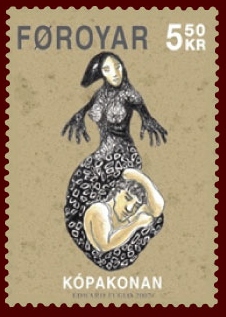
Alfred Elton van Vogt was a Canadian-born American science fiction writer. His fragmented, bizarre narrative style influenced later science fiction writers, notably Philip K. Dick. He was one of the most popular and influential practitioners of science fiction in the mid-twentieth century, the genre's so-called Golden Age, and one of the most complex. The Science Fiction Writers of America named him their 14th Grand Master in 1995.
A monster is a type of fictional creature found in horror, fantasy, science fiction, folklore, mythology and religion.
A changeling is a figure in West European folklore.

The Silkie is a Chinese breed of chicken named for its atypically fluffy plumage, which is said to feel like silk and satin. The breed has several other unusual qualities, such as black skin and bones, blue earlobes, and five toes on each foot, whereas most chickens have only four. They are often exhibited in poultry shows, and also appear in various colors. In addition to their distinctive physical characteristics, Silkies are well known for their calm and friendly temperament. It is among the most docile of poultry. Hens are also exceptionally broody, and care for young well. Although they are fair layers themselves, laying only about three eggs a week, they are commonly used to hatch eggs from other breeds and bird species due to their broody nature. Silkie chickens have been bred to have a wide variety of colors which include but are not limited to: Black, Blue, Buff, Partridge, Splash, White, Lavender, Paint and Porcelain.

The Australian Terrier is a small breed of dog of the terrier type. The breed was developed in Australia, although the ancestral types of dogs from which the breed descends were from Great Britain.

Selkies are mythological creatures that can shapeshift between seal and human forms by removing or putting on their seal skin. They feature prominently in the oral traditions and mythology of various cultures, especially those of Celtic and Norse origin. The term “selkie” derives from the Scots word for “seal”, and is also spelled as silkies, sylkies, or selchies. Selkies are sometimes referred to as selkie folk, meaning 'seal folk'. Selkies are mainly associated with the Northern Isles of Scotland, where they are said to live as seals in the sea but shed their skin to become human on land.
Jenna is a female given name. In the English-speaking world it is a variation of Jenny, which is itself a diminutive of Jane, Janet, Jennifer and is often used as a name in its own right.

The Australian Silky Terrier or simply Silky Terrier is a small breed of dog of the terrier dog type. The breed was developed in Australia, although the ancestral types and breeds were from Great Britain. It is closely related to the Australian Terrier and the Yorkshire Terrier. The breed is called the Silky Terrier in North America, but is called the Australian Silky Terrier in its country of origin and in the rest of the world.

"The Great Silkie of Sule Skerry" or "The Grey Selkie of Sule Skerry" is a traditional folk song from Orkney and Shetland. A woman has her child taken away by its father, the great selkie of Sule Skerry which can transform from a seal into a human. The woman is fated to marry a gunner who will harpoon the selkie and their son.
A fix-up is a novel created from several short fiction stories that may or may not have been initially related or previously published. The stories may be edited for consistency, and sometimes new connecting material, such as a frame story or other interstitial narration, is written for the new work. The term was coined by the science fiction writer A. E. van Vogt, who published several fix-ups of his own, including The Voyage of the Space Beagle, but the practice exists outside of science fiction. The use of the term in science fiction criticism was popularised by the first (1979) edition of The Encyclopedia of Science Fiction, edited by Peter Nicholls, which credited van Vogt with the term’s creation. The name “fix-up” comes from the changes that the author needs to make in the original texts, to make them fit together as though they were a novel. Foreshadowing of events from the later stories may be jammed into an early chapter of the fix-up, and character development may be interleaved throughout the book. Contradictions and inconsistencies between episodes are usually worked out.
Soda pop is a U.S. regional term for a soft drink that’s sweetened and carbonated.
Gypsy or gipsy is an English name for the Romani people.

The Silkie is a fix-up science fiction novel by Canadian-American writer A. E. van Vogt, first published in complete form in 1969. The component stories had previously been published in Galaxy Science Fiction magazine.
Nuala or Fionnuala is an Irish feminine given name, derived from Irish mythology - being either a diminutive form of Fionnuala, the daughter of Lir, or an alternate name for Úna, wife of Finvarra, king of the fairies.
A selkie is a mythological creature found in Faroese, Icelandic, Irish, and Scottish folklore.
This page is based on this
Wikipedia article Text is available under the
CC BY-SA 4.0 license; additional terms may apply.
Images, videos and audio are available under their respective licenses.






